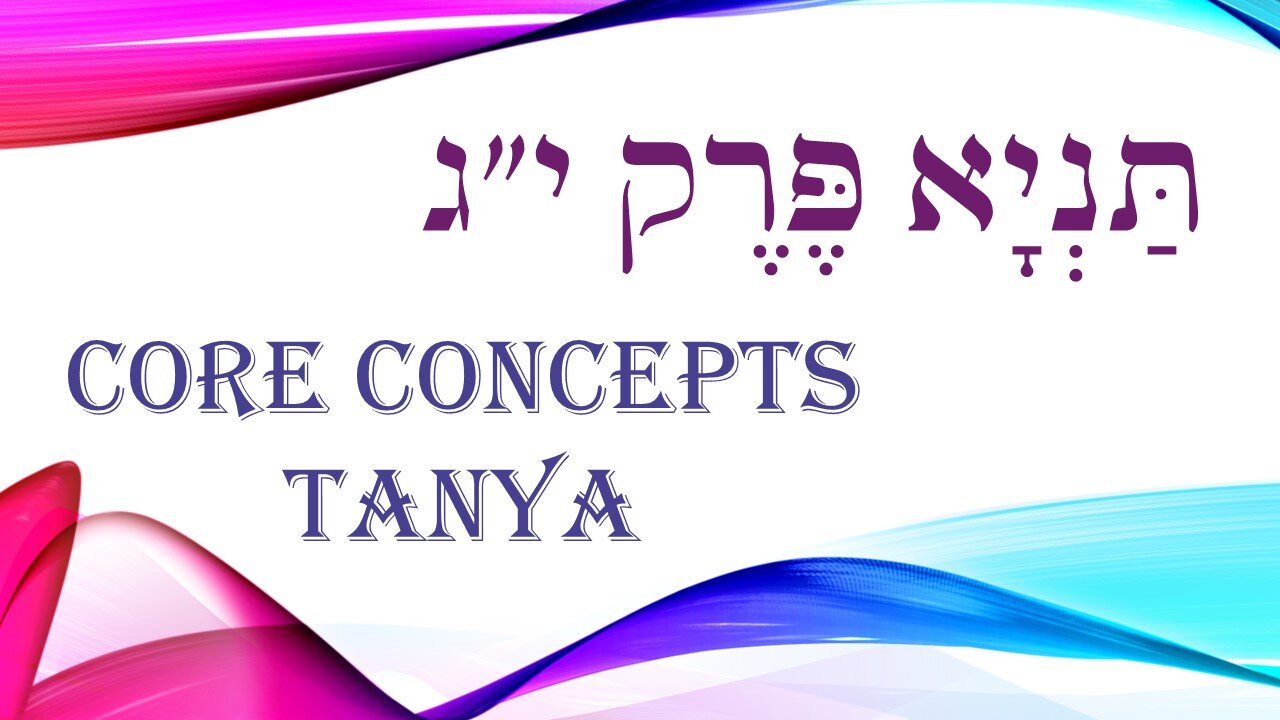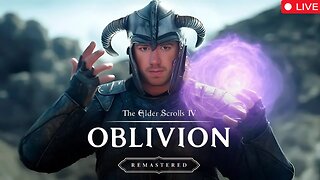Premium Only Content

Core Concepts Tanya: Chapter 13
Brief Recap of Chapter 13:
1. Chapter 13 teaches that in a Beinoni "zeh v'zeh shoftan," "this one and this one judge."
Note the phrasing, not "rules" but "judges," because if the Animal Soul ever rules then he's not a Beinoni.
Rather, from its seat in the left part of the heart, the evil inclination sends up impulses to the mind, encouraging him to give into desires, cravings, inappropriate behaviors, transgression, etc.
Then the good inclination steps in and tries to push out these thoughts before they can take over any of the three soul garments of thought, speech, or action.
This battle is often difficult and seemingly equal, so a third judge is called in to act as arbitrator and break the ensuing stalemate.
In this case, Hashem Himself, who gives the Beinoni the extra boost he needs with the light of G-dly soul.
As in the last chapter, darkness is the absence of light, folly is the absence of wisdom. A little bit of light, a little bit of wisdom dispels darkness/folly.
2. If the Beinoni’s good side always wins, then why isn't he a Tzaddik?
Because he hasn't absolutely conquered his animal soul, and so has to keep fighting.
Additionally, each time he does something mundane, even permissible and not inherently evil, he gives strength to his Animal Soul.
For example, a person has to eat to live, yet, which soul tells the Beinoni to eat? The Animal Soul.
3. With this we return to the verses opening the first chapter, which seem to contradict each other.
Before a soul comes down to this world it is administered an oath to be a Tzaddik and not a Rasha. Even if the whole world tells him that he's a Tzaddik, he has to see himself like a Rasha.
At the same time, he is warned to not consider himself a Rasha or he'll be discouraged or apathetic.
Again, word choice is important. We must see ourselves "like" a Rasha, as in, we should realize that no matter how well we do, we still maintain the capacity to go astray.
Unless someone's an absolute Tzaddik, temptations are still alive within him, and he has to vigilantly guard against them.
Still, we should regard ourselves as a Beinoni, as someone who can do the right thing even though this battle is waged every day.
We can do the right thing, and get much credit for it, even if it's a struggle.
4. Remember, "the mind rules the heart."
The way we make sure this happen is with our faculty of "Binah," or "understanding."
Understanding is connected to "Gevurah," "Strength," because it can help us overcome and just say no.
The more we think and contemplate something, the greater chance we have of eliciting an emotional response toward it.
In the negative, if something minor happens, but it just gets us in the wrong way, we fulminate about it until it becomes a 10 on the Richter scale.
In the positive, we can use this power to really think about the good in our lives, to think about our blessings, to think good things, and that will encourage us to do more good and to increase in our service of G-d. After all, the ultimate use of this ability is in creating and fostering a love of G-d that will influence us to do what He wants.
5. Just because someone sits all day and learns Torah, doesn't mean that he is a Tzaddik.
It's difficult to tell from the outside, but that person may still have an Animal Soul very much alive and well in him.
Just like a slumbering person can awaken at any moment, so can the Animal Soul. Which is a very effective way of catching us off guard!
6. This is why the verse tells us "one nation shall prevail over the other."
It doesn't say completely conquer, because, as Rivkah was warned about Yaakov and Esav, "when this one rises, this one falls."
Like a seesaw, one nation (read: one soul) will always be stronger than the other, but like a seesaw it can go either way.
7. If a Beinoni is always fighting but never winning the ultimate war, is his service true?
Truth is eternal and unchanging, which is what makes it true.
At the same time, Tanya reassures us that there are truths relative to each level of service.
For a Beinoni, this level of struggle is truth for him. It wouldn't be considered good enough for a Tzaddik, which is why he isn't considered a Tzaddik, but this is right for where a Beinoni is.
Think of the difference between a kid and a college student.
Ask a kid to read "Go, Dog, Go."
If he can get through the whole book, he's a genius!
If a college student does the same thing, it’s not the same.
An amazing points about this chapter is the reassurance that we don't have to move mountains and be someone we're not.
Tanya sets a very high bar, but also reminds us that this journey is constant, and doesn't happen overnight. Everything we do counts, and maybe that will give us the courage we need to aim just a little bit higher.
-
 LIVE
LIVE
Akademiks
1 hour agoDay 8/30. Shannon Sharpe Over Cooked? Accuser Drops more Audio.' Uzi Rushed to Hospital? Kevin Gates
2,819 watching -
 8:08
8:08
JustPearlyThings
1 hour agoPearl Daily Live Stream
1471 -
 1:00:04
1:00:04
Iggy Azalea
2 hours ago $0.54 earnedF**K strategy Its boring. Risky moves only tonight...
30.7K16 -
 2:48:37
2:48:37
TimcastIRL
4 hours agoDoD Branch Chief GOES ROGUE, Vows To RESIST Trump, Tulsi Refers Leakers For PROSECUTION |Timcast IRL
156K137 -
 1:04:56
1:04:56
Man in America
8 hours agoWAIT!? China's Population is LESS THAN 500M? Expert Reveals SHOCKING Data
25.8K26 -
 LIVE
LIVE
RalliedLIVE
8 hours ago $0.29 earnedWednesday Warzone Special w/ Rallied
448 watching -
 3:19:56
3:19:56
Fragniac
5 hours ago🔴FORTNITE w/ The BRRRAP PACK ( -_•)╦ ╤─💥
12.3K -
 LIVE
LIVE
I_Came_With_Fire_Podcast
11 hours agoLOWERING THE TARIFFS | THE HEGSETH SIGNAL | RUNNING TREN
353 watching -
 9:34:32
9:34:32
Dr Disrespect
12 hours ago🔴LIVE - DR DISRESPECT - WARZONE - HOW TO WIN SOLO GAMES
174K18 -

TheNateVibez
4 hours agoRisking it all to save Tamriel and it's people✌ || Agent of the Nine⚔
10.5K